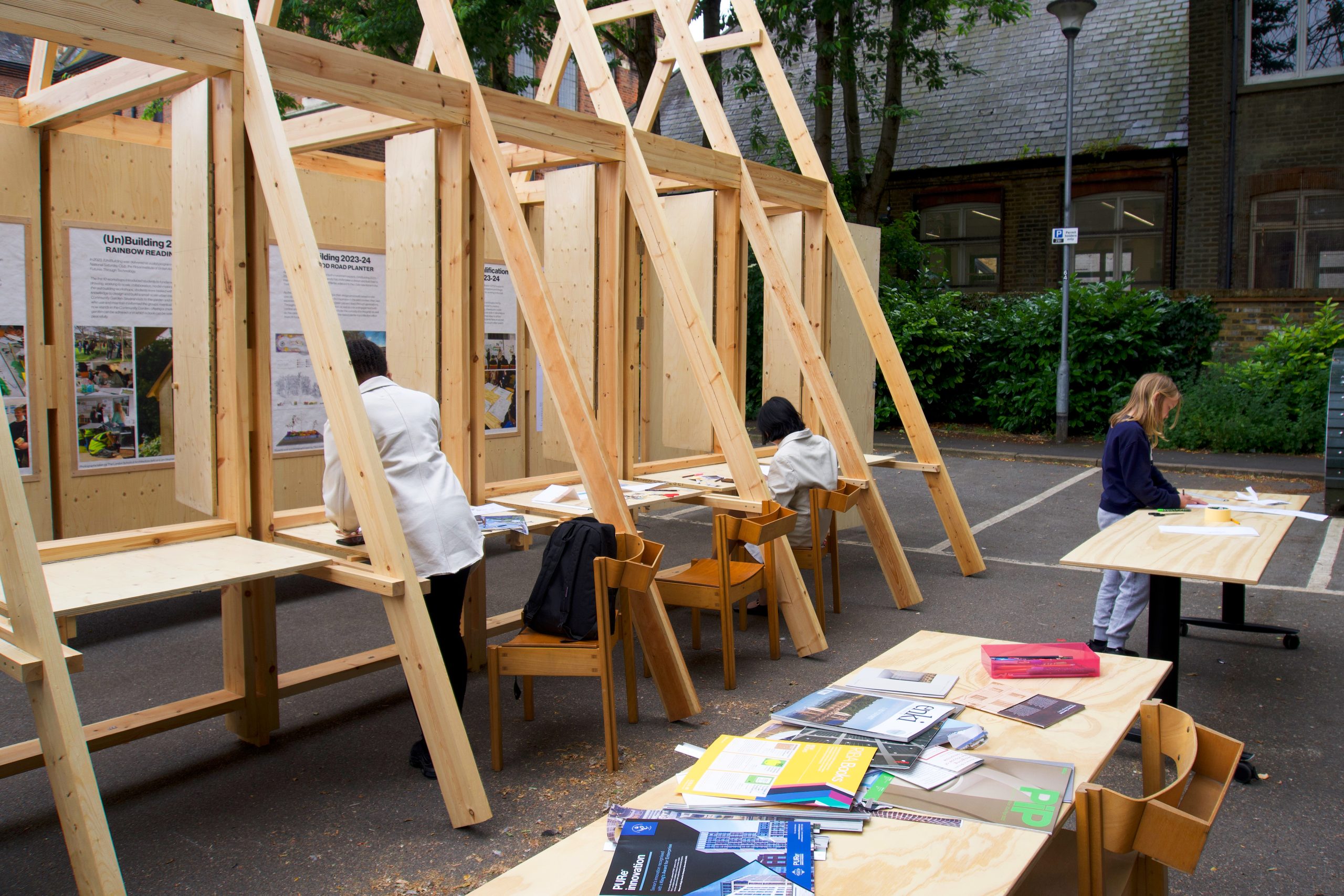Part 0 is aimed at 13-to-19-year-olds and career changers, widening access to the built environment and emphasising green skills.
Describe who you are
We lead on the London School of Architecture's (LSA) access and outreach campaign, Part 0, developing and delivering courses for 11–to-19-year-olds. Despite both being qualified architects, we’re keen to offer a broad introduction to the built environment either through live build projects or fictional briefs. We want to provide foundational knowledge and skills that can develop in different directions.
What is the aim of your organisation?
Part of LSA’s founding mission was to create alternative routes into architecture, particularly making architectural education more affordable and accessible. Part 0 focuses on improving the visibility of, and access to, built environment professions to increase diversity within the sector.
Advertisement

HomeGrown Plus workshop at the Dalston Pavilion (photo: London School of Architecture)
Are you volunteer-led?
We are not volunteer-led but benefit from support from LSA’s Practice Network which is made up of over 250 London-based built environment businesses.
Do you partner with any other organisations?
Our (Un)Building course is delivered in collaboration with the RIBA as well as the National Saturday Club organisation. Both partners are hugely supportive of LSA’s ambitions to improve diversity within the sector. Being able to take students on a tour of the RIBA’s headquarters at Portland Place, taking part in the National Saturday Club’s graduation ceremony and summer show at Somerset House are great aspects of the course that would not otherwise be possible!
Our EPQ in Architecture is supported by the Stephen Lawrence Day Foundation, Rothschild & Co’s philanthropic foundation R&Co4Generations and east London's Foundation for Future London. Thanks to these partners, we offer this Level 3 qualification as a free-to-access programme, which spans an academic year, offering introductions to built-environment professionals and preparing young people in their career ambitions

(Un)Building workshop (photo: London School of Architecture)
What kind of programmes do you run and which has been the most successful?
Our Part 0 campaign launched with the (Un)Building programme in the 2022-23 academic year, with a cohort of 15 13–16-year-olds. This year we have been able to expand to four programmes: Crafting Cities for year 7-9; (Un)Building; EPQ in Architecture for Year 12 students; and PlanBEE:London, a higher apprenticeship programme in Design, Construction and Management for 18+ in partnership with Gateshead College and Ryder Architecture.
What has been your landmark achievement?
The routes we have been able to open for our Part 0 students. This starts with a very hands-on recruitment process to ensure we are reaching as many young people as possible, not just those who know where to look and have the self-confidence to explore opportunities.
Advertisement
This year’s Dalston Pavilion exemplified this approach to outreach. As part of the London Festival of Architecture, the pavilion hosted 22 workshops run by organisations such as Homegrown Plus, Accelerate, the RIBA and Drawing Matter, welcoming over 450 participants.

Drawing Matter workshop at the Dalston Pavilion (photo: London School of Architecture)
What role are you filling that other outreach programmes aren’t?
Our programmes span an entire academic year and are all free to access. The content of the courses adjusts in response to the age of our students. For example, (Un)Building is a weekend course and incorporates a live build element, whereas our EPQ offers an introduction to higher education learning formats. All our programmes provide a multidisciplinary introduction to the built environment with a strong emphasis on craft and understanding how things are made.
What single biggest change would you like to see in the architecture industry?
It’s important that salaries improve. Without this, encouraging more people into the industry from a wider spectrum of backgrounds, no matter the good intention, is not helpful.
What advice do you give your students who are thinking of pursuing a career in the built environment?
Be curious and confident – easier said than done! We always encourage our students to ask questions and explore new courses. There is no harm in sending a cold email! We try to impress on our students the value of trying new things, meeting new people and being proactive, which they all are, having dedicated so much time to an extracurricular course!
Questions answered by Roy Coupland and Ya Ya Chen, course leaders on Part 0
 The Architects’ Journal Architecture News & Buildings
The Architects’ Journal Architecture News & Buildings




Leave a comment
or a new account to join the discussion.